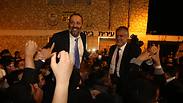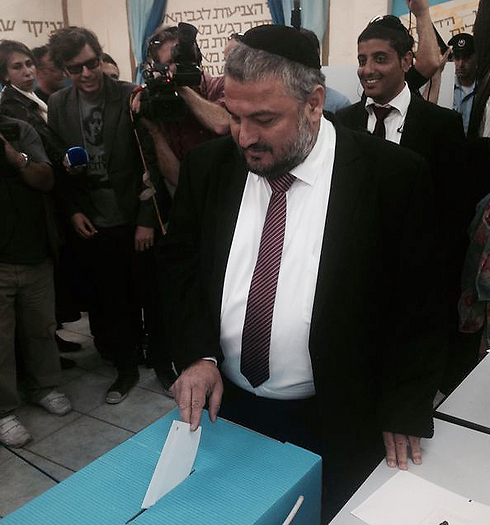
Local re-elections: Haredi candidate takes Beit Shemesh; Nazareth ousts incumbent
After court disqualifies previous local election results in townships amid fraud, re-election held only to maintain original results: In Beit Shemesh, haredi Abutbul preserves his victory, in Nazareth 20-year mayor ousted by pro-business deputy.
The re-elections in both Beit Shemesh and Nazareth took place after the Supreme Court rejected the results of their October ballots, citing voter fraud. Both were considered a bellwether for shifting social relations in Israel.

In Beit Shemesh, a highly contested campaign almost tore the city apart along religious faultiness, pitting the secular and religious-Zionist public against the ultra-orthodox.
The haredi candidate for Shas, Moshe Abutbul, recreated his October victory and carried the vote with 51.3%, beating out Bayit Yehudi candidate Eli Cohen. The final tally was 19,401 for Abutbul and 18,643 for Cohen.
In Nazareth, incumbent Ramiz Jaraisy, who has led the city since 1994, lost town hall to his deputy Ali Salam 27,666 to 17,266.
Cohen conceded defeat on Wednesday, telling Israel Radio that the majority decided "it wants a city with an ultra-Orthodox character."
The city's 100,000 residents are almost equally split between ultra-Orthodox and other Jewish groups. Results from initial elections in October showed voters lined up almost entirely along religious affiliation.
The elections in both cities were considered to have larger political and symbolic ramifications for their respective publics. In Beit Shemesh, Abutbul's victory is viewed by many as sign at the growing local power of haredim at the expense of the secular population.
But Abutbul promised Wednesday that the city will remain a home for both haredim and secular Jews.
"This city is a microcosmos of the state of Israel and has everything - religious, secular, new olim from both the Sovient Union and Eithiopia, and haredim. We will keep this mix, and bring in more residents from all types. I think that will be the secret of Beit Shemesh's success," he told Ynet.
Abutbul vowed to serve all residents of the city - both haredim and secular Jews. "A mayor, from the moment he is elected, he is everyone's mayor and must serve everyone."
In Nazareth, Salem's victory signaled a change in the Arab-Israeli public, apparently tired of long-term local incumbents plagued by corruption and nepotism. The result indicates that the town wants a more open and pro-business candidate who is able to overcome local divides, and turn the predominantly Arab town around.
Itay Blumental, Amit Cutler and the Associated Press contributed to this report.










